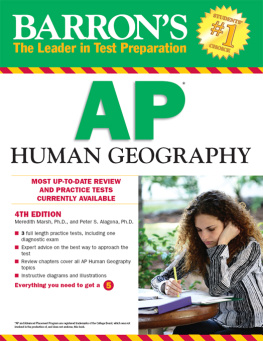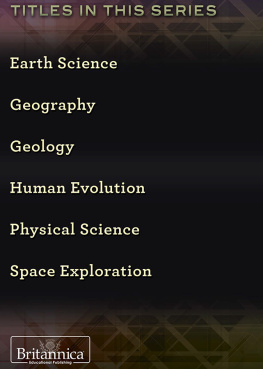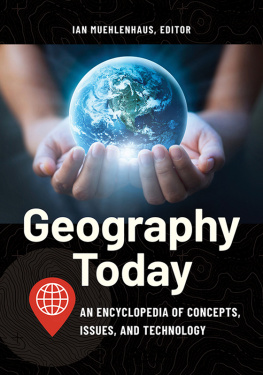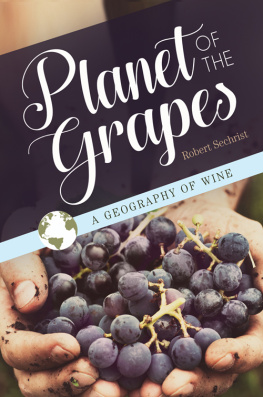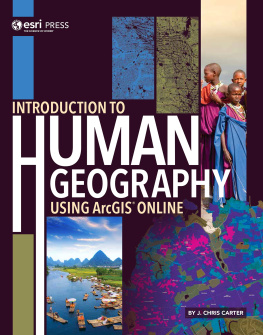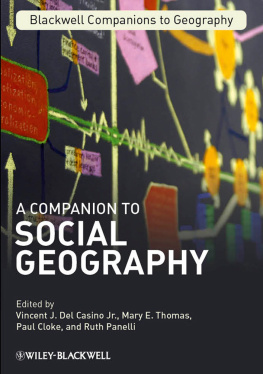ROUTLEDGE LIBRARY EDITIONS:
SOCIAL AND CULTURAL GEOGRAPHY
Volume 9
REMAKING HUMAN GEOGRAPHY
REMAKING HUMAN GEOGRAPHY
Edited by
AUDREY KOBAYASHI
AND SUZANNE MACKENZIE
First published in 1989
This edition first published in 2014
by Routledge
2 Park Square, Milton Park, Abingdon, Oxon, OX14 4RN
and by Routledge
711 Third Avenue, New York, NY 10017
Routledge is an imprint of the Taylor & Francis Group, an informa business
1989 Audrey Kobayashi, Suzanne Mackenzie, and contributors
All rights reserved. No part of this book may be reprinted or reproduced or utilised in any form or by any electronic, mechanical, or other means, now known or hereafter invented, including photocopying and recording, or in any information storage or retrieval system, without permission in writing from the publishers.
Trademark notice: Product or corporate names may be trademarks or registered trademarks, and are used only for identification and explanation without intent to infringe.
British Library Cataloguing in Publication Data
A catalogue record for this book is available from the British Library
ISBN: 978-0-415-83447-6 (Set)
eISBN: 978-1-315- 84860-0 (Set)
ISBN: 978-0-415-73332-8 (Volume 9)
eISBN: 978-1-315-84849-5 (Volume 9)
Publishers Note
The publisher has gone to great lengths to ensure the quality of this reprint but points out that some imperfections in the original copies may be apparent.
Disclaimer
The publisher has made every effort to trace copyright holders and would welcome correspondence from those they have been unable to trace.
REMAKING HUMAN GEOGRAPHY
Edited by
Audrey Kobayashi
Suzanne Mackenzie
Audrey Kobayashi, Suzanne Mackenzie, and contributors 1989 This book is copyright under the Berne Convention. No reproduction without permission. All rights reserved
Unwin Hyman, Inc.
8 Winchester Place, Winchester, Mass. 01890, USA
Published by the Academic Division of
Unwin Hyman Ltd
15/17 Broadwick Street, London W1V 1FP, UK
Allen & Unwin (Australia) Ltd,
8 Napier Street, North Sydney, NSW 2060, Australia
Allen & Unwin (New Zealand) Ltd in association with the
Port Nicholson Press Ltd,
Compusales Building, 75 Ghuanee Street, Wellington 1, New Zealand
First published in 1989
Library of Congress Cataloging-in-Publication Data
Remaking human geography / edited by Audrey Kobayashi & Suzanne Mackenzie
p. cm.
Bibliography: p.
Includes index.
ISBN 0044453256
1. Anthropo-geographyPhilosophy. 2. Anthropo-geographyMethodology. I. Kobayashi, Audrey Lynne. 1951
II. Mackenzie, Suzanne.
GF21.R46 1989
304.2dc19
British Library Cataloguing in Publication Data
Remaking human geography.
1. Human geography
I. Kobayashi, Audrey II. Mackenzie,
Suzanne 304.2
ISBN 0044453256
Typeset in 10 on 11 point Bembo by Columns of Reading and printed in Great Britain by Billing & Sons Ltd, Worcester
This book is concerned with developing a dialogue between humanism and historical materialism in human geography. It seems to me that its contributions differ from those made by participants in the debates which took place in the 1970s in a number of important ways. These emerge with great clarity from the essays which follow, but it might be helpful to signpost some of them in advance (though there are obvious dangers in doing so: there are differences between the contributors which ought not to be glossed over in any genuine debate).
First, a programme of this kind does not involve a direct mapping of philosophy or social theory into human geography. In the past, I suspect, there was a tacit assumption that most of our problems had to be resolved on some privileged terrain outside the discipline and then projected on to it. On this reading, geography was at best parasitic on developments taking place elsewhere. The situation has now changed, and there is an increasing recognition of the importance of concepts of place, space and landscape across the whole field of the humanities and the social sciences. Their incorporation does not leave the traditional orthodoxies unchanged far from it but within human geography (if we can still speak within the usual disciplinary enclosures) humanism can no longer be portrayed as a parochialism in which the day-to-day lives of particular people in particular places is the single focus of study, any more than historical materialism can continue to be criticized as a brute globalism in which the specificities of history and geography are read off from the universal logic of the (capitalist) mode of production. Both traditions have moved beyond those simple reductions towards a recognition of the complexity of human geographies: towards the realization that, as Mann puts it, societies are much messier than our theories of them.
Second, it follows that neither humanism nor historical materialism are exercises in pure abstraction. Some of the early writings (on both sides) probably deserve that description: too many appeals to the human subject or to the logic of capital. But no more. Humanistic geography is increasingly concerned with making sense of the dynamics of concrete language-games and not, as Geertz once so pungently put it, with discovering the Continent of Meaning and mapping its bodiless landscape. Historico-geographical materialism, too, is much more attentive to the variability of capitalism across time and space and the emergence of distinctively new regimes of accumulation. To say this is not to imply that either of them is inimical to theoretical reflection or to the construction of theoretical systems all of these essays demonstrate the connective imperative between the theoretical and the empirical but it might well require us to rethink what we mean by (and expect of) theory itself: to re-cast the relations between what some commentators see as Grand Theory (or not-so-grand theory) and local knowledge.
Opening up that wider conversation has required a third change: a movement beyond the old absolutisms which all but paralysed previous discussions. This is more than an argument about recognizing the plurality of traditions within both humanism and historical materialism (important though that is); it is also about recognizing the cross-currents between them. Let me give two obvious examples. Contemporary versions of humanism need to be distinguished and certainly more clearly distinguished than is usually the case from liberal individualism and its characteristic emphasis on the autonomy of the individual. It would not be difficult to identify a series of developments, all of them located within a broadly conceived humanism, which accentuate the boundedness of human agency and seek to disclose the various systems and structures which enter into the constitution of social life. Equally, historical materialism cannot be confined to its largely structural versions; these were never as constricting as most of their critics seemed to think, but in any event there are now versions of rational choice or game-theoretic Marxism which claim that all social phenomena are explicable only in terms of individuals and attempt to expose the microfoundations of historical materialism. It should go without saying that developments of this kind need careful scrutiny, and I would not want to endorse either of these particular examples; but taken together they do suggest that critical examination (and reconstruction) ought not to mean a narrowly sectarian exegesis. Of course there are differences between intellectual traditions, and I think it unlikely that these can be resolved by appeal to any supra-disciplinary court; but I also think it intrinsically implausible to assume that any one perspective has a monopoly of understanding or insight. I realise that this raises the spectre of relativism even nihilism but in so many ways the essays in this collection point to a movement beyond both relativism and absolutism. It is not a matter of accepting that anything goes, that one interpretation is as good as any other it doesnt and it isnt but rather of recognizing the creative tension which emerges through the mediation of different frames of reference.





